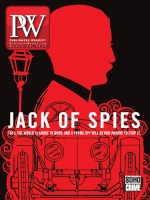In Bird Box, Malerman, a musician, offers a subtle, if chilling, look at a postapocalyptic America.
Where did the idea for Bird Box come from?
I’d just finished a rough draft of a book, and looking ahead, I saw an open month—nothing planned, no band, nothing happening. Two things came to mind. One was about a group of people forced to face infinity, and the consequences of that encounter. The other was just an image: a woman traveling down a river blindfolded. So I began working on the latter and realized along the way that she was fleeing from the former.
What do you think the appeal of end-of-the-world fiction is?
End times are interesting because they suggest your generation (or the generation being represented) is where all of history and civilization has lead up to. This moment. And that’s a hefty responsibility, if not a little egocentric. “We represent all of mankind, since this is the end, so we better make good!”
Do you think the book would translate well to film?
Absolutely. It’s hard not to want the movie to be pitch black, a blindfolded audience, crazy sounds and soundtrack. You could do wonders with that. A totally freaky trip to the theater. What self-respecting horror fan wouldn’t want to be blindfolded, sitting in a movie theater, while all this crazy shit is going on around him?
Why are the children of the lead, Malorie, just called Boy and Girl?
By naming the kids Boy and Girl, Malorie must have reached some kind of “essentials” philosophy. What good are names in this world? What’s the difference? Call them Chair and Couch. Shoe and Sock. I think that Malorie knows this: if it doesn’t have anything directly to do with surviving, then it’s a luxury, and she doesn’t have room for it. Names included.
What did alternating between the present and past achieve for you?
Very soon into the rough draft I understood that I could leave story clues in the present that would inform the past, and vice versa. After a while it became something of a Rubik’s Cube. For example, there are events in the past that Malorie must know of in the present, but she doesn’t reveal the fact that she knows of them in the present until they are revealed, for the reader, in the past. At that point, the reader might think, “Oh, I see why she did this or that now!” That’s so fun as an author. Makes you feel like a juggler in a dreadful circus; juggling horror clues backstage, waiting for the werewolf on the tricycle to be done already.



 Volume 261
Issue 12
03/24/2014
Volume 261
Issue 12
03/24/2014





